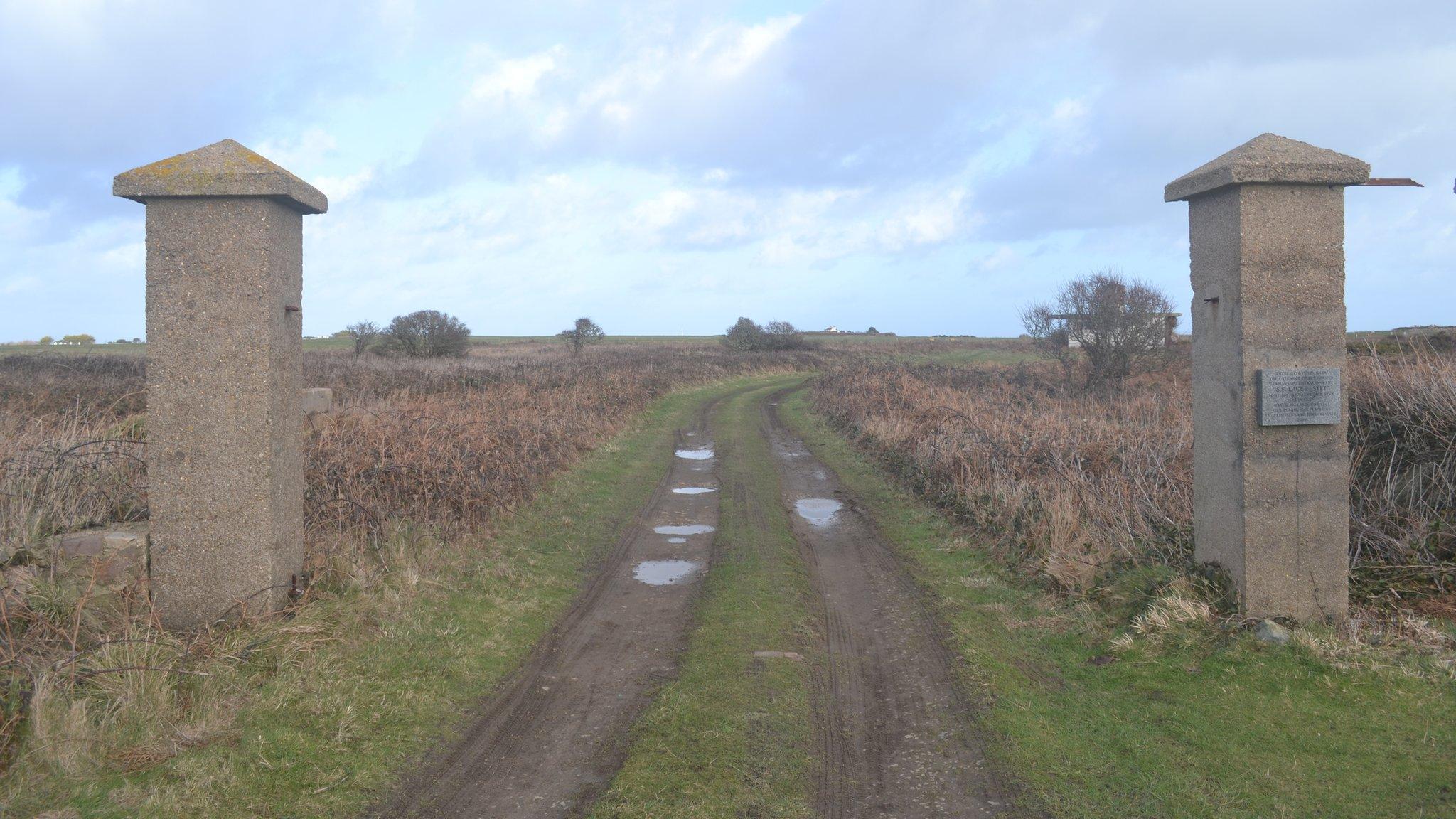Alderney remembers 75th anniversary of evacuation
- Published
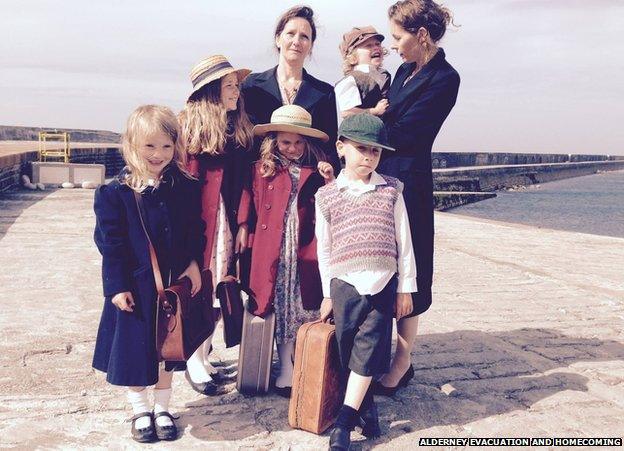
Children in Alderney will re-enact the evacuation of the island
Islanders who were forced to flee their homes to escape the Nazis and make new lives hundreds of miles away are marking the traumatic event 75 years on.
On 23 June 1940, after just a few hour's notice, the entire population of Alderney - about 1,500 people - gathered on the quay at Braye Harbour to be evacuated to the UK.
Many never returned to their island home or saw loved ones again.
Shortly after they left, German forces took over Alderney and set up the only concentration and forced labour camps on British soil.
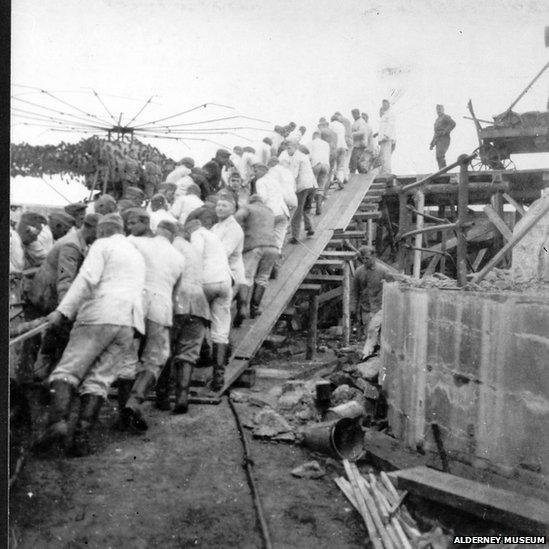
Hundreds of slave labourers died in camps in Alderney during the occupation
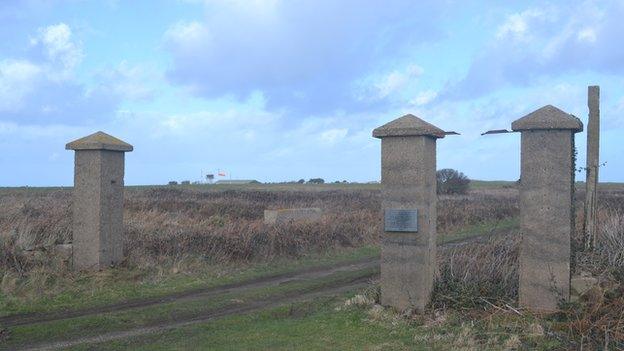
The gateposts of Lager Sylt are the stark reminder of only concentration camp on British soil
Now, pupils from Alderney's school are re-enacting the start of that life-changing journey and hearing the experiences of surviving evacuees.
In 1940, in the face of rapidly advancing German forces, Guernsey and Jersey only had time to evacuate about 24,000 people out of a total of about 90,000, but six Royal Navy ships were sent to Alderney at the request of the island's government.
With the growing threat of invasion to the UK, the islanders were taken as far away from the south coast as possible and many ended up in Glasgow.
Eileen Sykes was a teenager when she was told she had to leave her home.
"It was very much a rush, I was called early on the morning and we could only take what we could carry.
"On the boat we were all jammed in together in the hold, they kept us out of sight because it was rumoured German planes were flying overhead.
"We travelled from Weymouth to Glasgow by train but we didn't know where we were going, it was just after Dunkirk and there were military people everywhere. It was quite worrying.
"When we got to Glasgow people were very kind. They came armed with French dictionaries because they thought we spoke French.
"We were amazed how long it stayed light in the evening because it was so much farther north than Alderney. I forged strong links with Scotland and have gone back regularly."
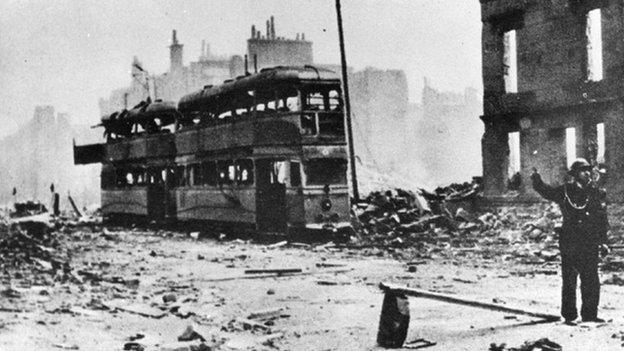
Many Alderney islanders were evacuated to Glasgow which was heavily bombed in 1941
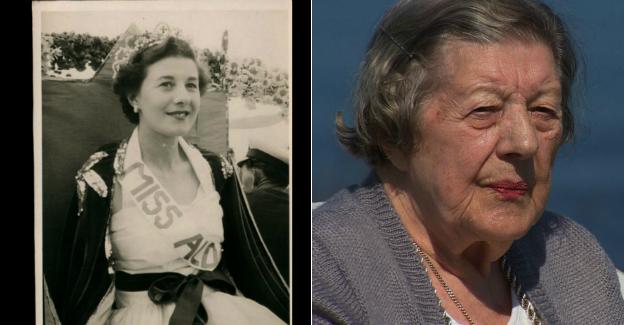
Eileen Sykes returned to her damaged home in Alderney in June 1946
Not every islander had such a positive experience, John Glasgow was three when he was evacuated with his parents to the city bearing his name and suffered tragedy just two days after arriving.
His mother was admitted to hospital suffering with advanced tuberculosis and died a few months later.
"I never saw my mother again after she went to hospital, and didn't find out where she was buried until 74 years later," he said.
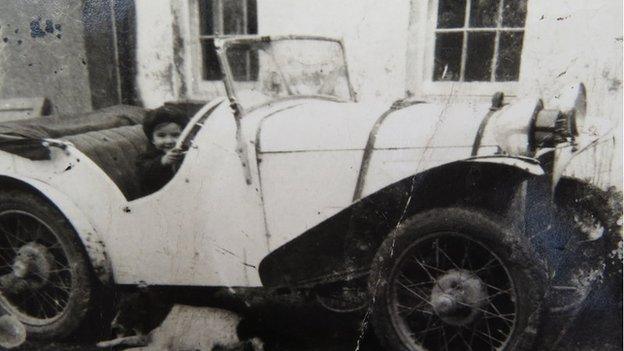
John Glasgow was evacuated from Alderney when he was three and spent most of the war in Winchester
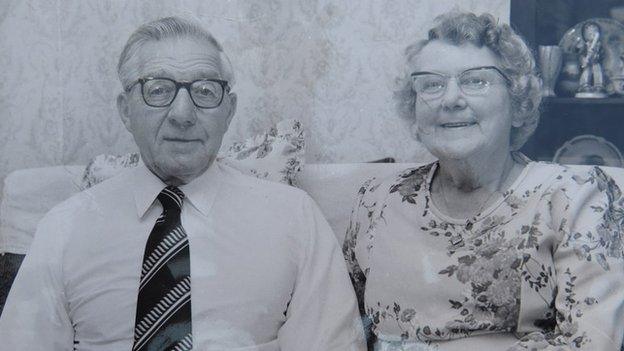
Frederick and Winifred Grant adopted John Glasgow after his father made a desperate plea
After staying in a children's home, John's father took him to Winchester where he was stationed, but because he was not allowed to stay on the army base his father had to quickly make other plans.
"He went around the town knocking on doors randomly asking people to take me in, eventually he found a childless couple who were happy to have me", John said.
He lived with Frederick and Winifred Grant for the rest of the war and they later became his adopted parents.
"They were wonderful, kind people. I was embraced into a very loving kind family."
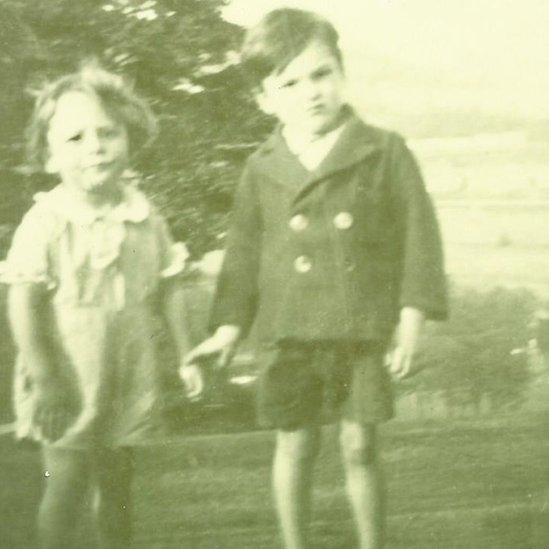
Francis Simonet and his brother Richard were sent with their five siblings to Glasgow
Island politician Francis Simonet was two years old when he arrived in Glasgow with his father, heavily pregnant mother and his six siblings.
"For my parents it was a big change. They were leaving a very rural community where people hadn't see trains or so many cars to a big busy city."
His siblings were "farmed out" to different places in the city but the family was later reunited in Halifax, Yorkshire.
He said: "Alderney men had a reputation for hard work and were sent to the Yorkshire quarries to help with the war effort where they did stone polishing and cutting."
To mark the 75th anniversary of the evacuation about 100 school children will go on a short ferry journey before returning to the harbour to re-enact the "Homecoming" , externalwhich took place on 15 December 1945 after the islands were liberated.
Event organiser Martin Batt said: "The island owes our surviving evacuees, their parents and contemporaries who are no longer with us, a huge debt of gratitude."
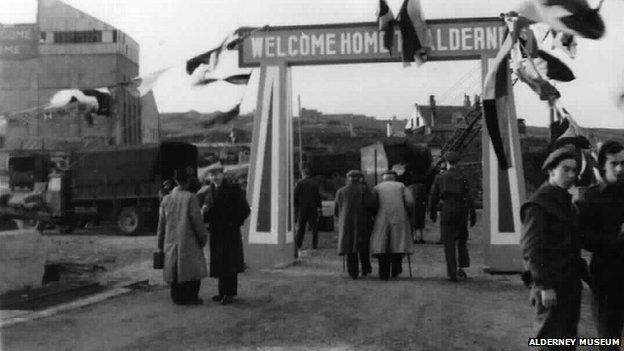
Islanders in Alderney returned in December 1945 to homes that had been destroyed and looted
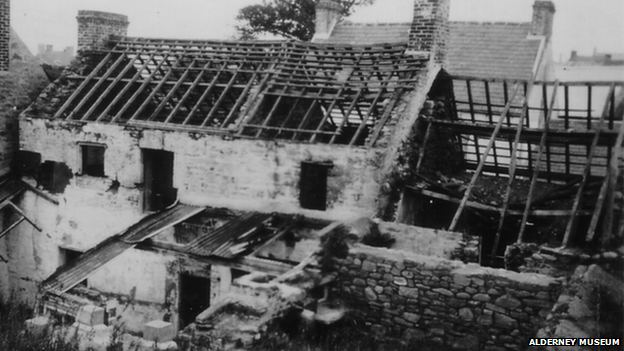
Homes all over Alderney were damaged during the occupation
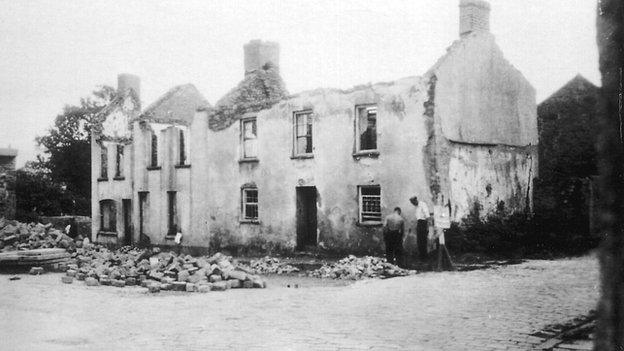
German prisoners were kept in Alderney after liberation to clear mines and repair some of the damage
Eileen Sykes remembers returning to a home ruined by German soldiers.
"Our house was wrecked and everything was derelict, German soldiers had taken furniture for firewood."
"In some parts of the island there was a sinister feeling after what happened in the worker camps."
When Francis Simonet returned home he saw the island as a haven away from wartime Britain.
"It was an adventure playground, the trenches, the guns they were all still in working condition.
"There were shortages, but we made do and adapted. There were wonderful beaches and it was a wonderful life after the stress of the UK."
- Published20 May 2015
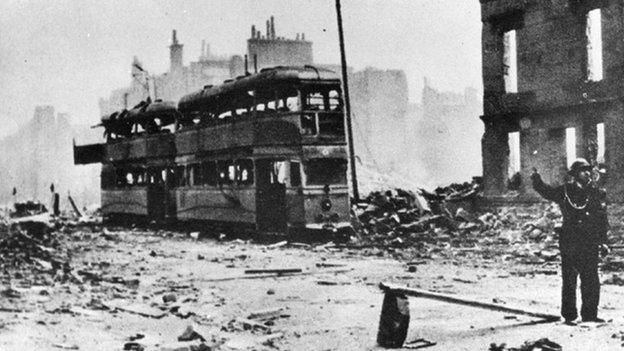
- Published9 May 2015
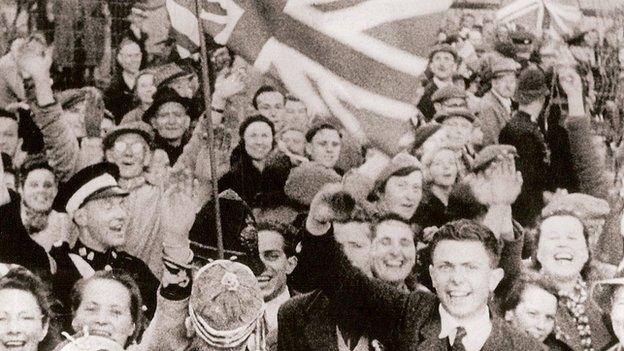
- Published9 May 2015
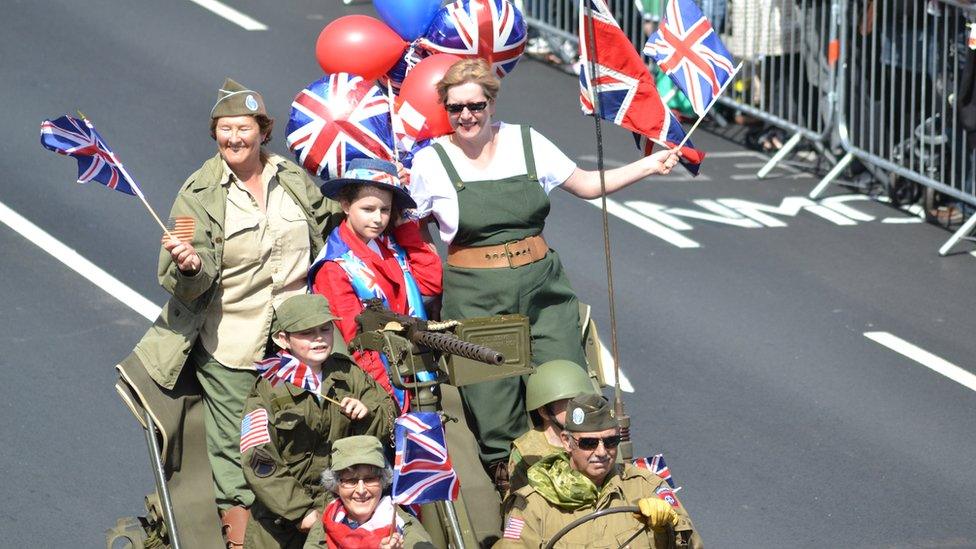
- Published10 March 2015
